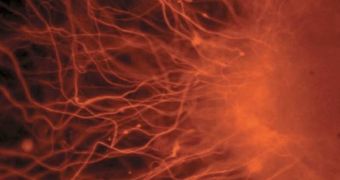British researchers announced yesterday that they'd created a new type of stem cells, directly derived from bone marrow, which had been genetically altered to seek out and destroy cancerous cells throughout the human body. They manage to destroy mutated cells by delivering a special protein directly into their midst. Experiments have thus far only succeeded in the laboratory and on mice models, but the researchers now plan to move to human testing. If successful, the new technique could supply healthcare providers with a new tool of treating and potentially defeating some of the most widespread forms of cancer in the world today.
“We've developed cells which specifically target cancer through the body and deliver an anti-cancer protein to where it is needed in a seek-and-destroy approach,” Reuters quotes University College London expert Dr. Michael Loebinger as saying yesterday in San Diego, at the American Thoracic Society annual conference. The scientist added that the killer protein had the ability to destroy mutated cells without actually harming any of the surrounding tissue, which is something that existing cancer therapies, such as chemo and radiation, do plentifully.
“Essentially, we've combined two pieces of research. The first is that mesenchymal stem cells have an innate ability to seek out tumors throughout the body,” the UCL expert told the news agency in a telephone interview. He explained that the protein that would do most of the “heavy lifting” in the new therapy was called TRAIL, and stood for TNF-related apoptosis-inducing ligand. “This protein has the ability to cause the death only of cancer cells. By combining these two approaches, we have a cell which has the ability to go around the body and find and destroy tumors,” he added.
Statistically, the UCL team found that approximately 38 percent of the tumors they'd addressed with the TRAIL protein were completely destroyed, and also that the compound affected a large number of cancer types, including cervical, breast, lung, and squamous cancer. “Lots of cancer have sensitivity to this TRAIL protein,” Loebinger pinpointed. Another good news is that these stem cells exhibit a property known as “immunoprivileged,” which means that the immune system will not attack them as belonging to another body. Thus, the same batch of cells could be used for multiple patients.

 14 DAY TRIAL //
14 DAY TRIAL //